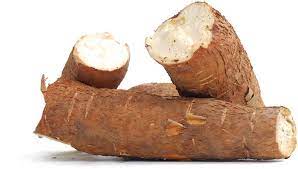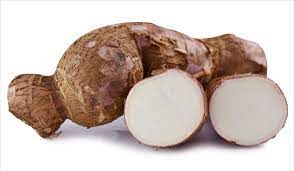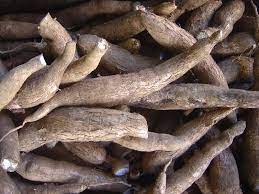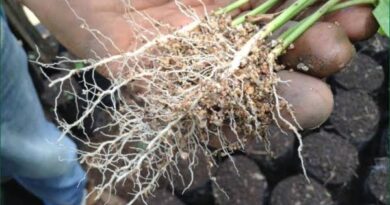Cassava Fruits: Economic Importance, Uses and By-Products
Cassava Fruits often referred to as cassava root or yuca, is a starchy tuberous root vegetable native to South America. While cassava is not typically considered a “fruit” in the traditional sense, as it is a root crop, it is an important source of carbohydrates and nutrition for many people around the world.
They are cylindrical in shape and have a rough, brownish outer skin that can sometimes be covered in waxy substances or dirt. The inner flesh is usually white or creamy, but some varieties may have a yellow or pink tint. Cassava roots have a firm and somewhat fibrous texture, similar to that of a potato, when raw.
Once cooked, cassava becomes softer and more tender. Cassava is a staple food in many tropical and subtropical regions, especially in Africa, Asia, and South America. It can be prepared in various ways, including boiling, frying, baking, or grilling.
Popular dishes made from cassava include cassava fries, cassava bread, cassava cakes, and cassava-based porridge. Cassava flour, a product made from dried and ground cassava roots, is used in baking and as a thickening agent in many recipes.
Cassava is an important crop in the diets of millions of people worldwide, providing sustenance and versatility in various culinary traditions. Its resilience in growing in diverse environmental conditions makes it a valuable food source, particularly in regions with challenging agricultural conditions.
The Economic Importance and Uses of Cassava Fruits

Cassava, also known as Manihot esculenta, is a tropical root crop that is widely cultivated for its economic importance and diverse uses. Cassava fruits are not commonly referred to as “fruits” but rather as the tuberous roots of the cassava plant.
Nevertheless, here are several economic and utilitarian aspects of cassava:
1. Food Source: Cassava is a staple food for millions of people in tropical and subtropical regions, particularly in Africa, Asia, and South America. The starchy roots are consumed in various forms, including boiled, fried, or processed into flour to make dishes like cassava bread, cakes, and traditional dishes.
2. Livestock Feed: Cassava roots and leaves are used as animal feed, especially for livestock like cattle, pigs, and poultry. The high carbohydrate content in cassava provides energy for the animals, while the leaves offer protein and other nutrients.
3. Industrial Uses: Cassava starch and cassava flour have various industrial applications. Cassava starch is used in the production of food products, paper, textiles, adhesives, and pharmaceuticals. Cassava flour is used in the baking industry and as a gluten-free alternative in various food products.
Read Also: Cassava Seeds: Economic Importance, Uses and By-Products
4. Alcohol Production: Cassava can be processed into ethanol, which is used for various purposes, including as a fuel additive and in the production of alcoholic beverages like cassava beer or spirits.
5. Biofuel Production: Cassava can be used to produce biofuels, such as bioethanol and biodiesel, contributing to renewable energy production and reducing dependence on fossil fuels.
6. Traditional Medicine: In some cultures, cassava is used in traditional medicine for its potential health benefits. It is believed to have medicinal properties, although scientific evidence supporting these claims is limited.
7. Gluten-Free Diet: Cassava flour is a popular ingredient in gluten-free diets and is used to make gluten-free baked goods like bread, cakes, and pastries. This is important for individuals with celiac disease or gluten sensitivity.
8. Starch-Based Products: Cassava starch is used to make a variety of products, including noodles, tapioca pearls (used in bubble tea and desserts), and thickeners for soups, sauces, and gravies.
9. Food Security: Cassava is a drought-tolerant crop and can grow in marginal soils, making it an essential food security crop in regions prone to environmental challenges like drought and poor soil quality.
10. Income Generation: Cassava farming and processing provide livelihoods for many small-scale farmers and entrepreneurs in tropical countries. It can be a reliable source of income and employment.
11. Export Commodities: Some countries export cassava and cassava-derived products to international markets, generating foreign exchange revenue. This export trade can boost the economy of producing nations.
12. Soil Improvement: Cassava plants can help improve soil fertility through their extensive root system and nitrogen-fixing abilities, benefiting crop rotation systems and overall agricultural sustainability
The Products and By-products That Can Be Derived From Cassava Fruits

Cassava, also known as manioc or yuca, is a versatile tropical root crop that can be processed into various products and by-products. These products are commonly derived from cassava roots, but in some cases, other parts of the cassava plant, such as leaves, can also be used.
Here is a list of products and by-products that can be derived from cassava:
1. Cassava Flour: Cassava flour is made by peeling, grating, fermenting, and then drying cassava roots. It is a starchy, gluten-free flour that can be used for baking, cooking, and as a thickening agent in recipes.
2. Cassava Starch: Cassava starch is extracted from cassava roots through a process of washing and centrifugation. It is widely used in food processing, particularly for making noodles, tapioca pearls, and as a thickener in soups and sauces.
3. Tapioca Pearls: Tapioca pearls are small, spherical, and translucent balls made from cassava starch. They are a primary ingredient in bubble tea and various dessert dishes.
4. Cassava Chips: Cassava chips are thin slices of cassava roots that are deep-fried or baked until they become crispy. They are a popular snack in many countries.
Read Also: Cassava Roots: Economic Importance, Uses and By-Products
5. Cassava Fries: Cassava fries are similar to potato fries but are made from cassava roots. They are often served as a side dish or snack.
6. Cassava Bread: Cassava bread is a type of bread made from cassava flour or cassava starch. It is a gluten-free alternative to wheat bread.
7. Cassava Noodles: Cassava noodles, also known as tapioca noodles or rice vermicelli, are translucent noodles made from cassava starch. They are commonly used in Asian cuisine.
8. Cassava Cake: Cassava cake is a dessert made from cassava flour, coconut milk, and sugar. It is popular in many tropical regions.
9. Cassava Pudding: Cassava pudding is a sweet dish made from cassava flour or grated cassava, sweetened with sugar or other sweeteners.
10. Cassava Chips: Cassava leaves can be used to make cassava chips. These chips are made by frying or roasting the leaves and are consumed as a snack in some regions.
11. Cassava Animal Feed: Cassava by-products, such as cassava peels and meal, can be used as animal feed for livestock like cattle, pigs, and poultry.
12. Bioethanol: Cassava can be processed to produce bioethanol, which is used as an alternative fuel source.
13. Cassava Paper: Cassava pulp, a by-product of cassava processing, can be used to make paper products.
14. Cassava Laundry Starch: Cassava starch can be used as a natural laundry starch for ironing clothes.
15. Cassava Medicinal Products: Some traditional herbal remedies use cassava for various medicinal purposes, although scientific evidence for their efficacy varies.
16. Cassava Industrial Products: Cassava starch is used in various industrial applications, including the production of adhesives, textiles, and pharmaceuticals.
In conclusion, it is important to note that cassava should be properly processed to remove toxins, primarily cyanogenic glycosides, which can be harmful if not eliminated through proper preparation techniques. Therefore, cassava should never be consumed raw. Proper processing methods ensure that cassava and its derivatives are safe for consumption and use.
Read Also: 5 Ways to Dispose Old Clothes (Used Clothes)









